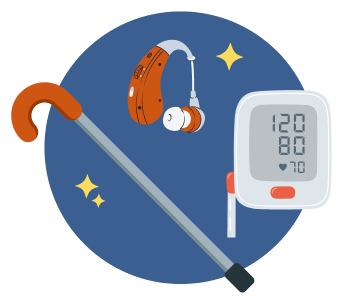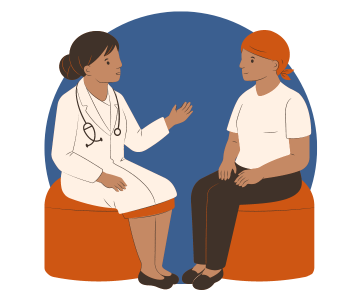How to Talk About Diabetes-Related Complications
A resource for healthcare heroes
Having diabetes increases the risk of a number of diabetes-related complications. Finding ways to reduce a person’s chances of developing chronic kidney disease, cardiovascular disease, retinopathy, or other complications is a key part of diabetes care. Complications are also not an “end-point” of diabetes, so supporting a long, healthful, and meaningful life for those living with complications is equally important.

These conversations around diabetes-associated complications can be scary, judgmental, and filled with fear-based messaging. This guide is designed to help you navigate these conversations with the people with diabetes in your practice in a more respectful and hopeful way.
General language guidance
People with diabetes, their families, and people at risk of diabetes deserve communications that are clear and accurate, respectful, inclusive, and free from judgment and bias.
No matter what the topic, there are some basic guidelines that everyone can implement. Choose to use language that:
- Is neutral, nonjudgmental, and based on facts, actions, or physiology/biology.1,2
- Is strengths-based, respectful, inclusive, and imparts hope.1,2
- Is person-centered.1,2
- Fosters collaboration between people with diabetes and healthcare teams.1,2
When a conversation centers around complications related to diabetes, keep these important general guidelines in mind:
- People may feel discouraged if certain complications are portrayed as “inevitable.” Focus on emphasizing a person’s ability to make incremental changes that can lower their risk of developing complications. If diabetes-related complications do develop, steer conversations toward the future, providing hope and tools for living well with complications.
- As you work towards facilitating person-centered and collaborative relationships with the people with diabetes in your care, it’s important that you make sure they feel heard if asking questions or expressing fear about health concerns. Ask questions that allow each person to have a say in the decision-making process for their care.
For more information about general language guidance that can help reduce diabetes stigma, including specific words and phrases to use (or avoid), visit the dStigmatize Language Guide.
Having a stigma-free conversation about diabetes-related complications
1. Avoid fear-based messaging, scare tactics, and stigmatizing language.
People with diabetes report feeling distressed or afraid during discussions about complications.3 Avoid fear- and loss-based messaging and imagery that contributes to these experiences (e.g. “If you don’t lower your A1C, you will go blind,” or, “You will lose your legs if your diabetes doesn’t improve”). This tactic is often used as a tool to encourage behavior change, however it can be counterproductive.4

Fear-based messaging fails to promote self-efficacy, or confidence in one’s abilities to make positive behavior changes, reduce risk factors, and live well with complications.1,4 Validate the feelings of fear or anxiety that a person may experience, without using fear as a motivator for change.
2. Emphasize specific strengths-based and evidence-based recommendations for living well with complications.

Work alongside people with diabetes to identify and address their personal concerns and barriers, foster collaborative decision-making, and focus on the incremental, targeted, and evidence-based changes they can make to live well now and in the future. Seemingly small changes can have an outsized impact on health, happiness, and hope when living with diabetes-related complications.
When discussing complications, especially with people who are already living with one or more diabetes-related complications, it is important to be future-oriented and support each person’s unique challenges and goals. Aim to provide access to tools, resources, or medical interventions that can improve outcomes and quality of life.
3. Be clear that complications are not a failure of diabetes management.
When a person is diagnosed with a diabetes-related complication, it can feel as though they’ve “failed” at managing diabetes. These feelings are often reinforced by stigma and stereotypes about diabetes and its associated complications.4
Help reduce people’s fears by emphasizing that complications are not a sign that someone “failed” or is “not good enough.” Praise positive management behaviors, effort, and accomplishments.
4. Be mindful of nonverbal communication.
Communication begins before any words are spoken. Be aware of the impact that nonverbal communication, such as facial expressions, body language, gestures, or gasps may have on a person with diabetes or their loved ones.
In addition, be mindful of informational posters or materials displayed in the clinic that include graphic or fear-inducing depictions, which may lead to distress and avoidance of discussions about diabetes-related complications.

5. Avoid using overly technical language or language commonly used in electronic health records in conversations with people with diabetes.
Each conversation should be tailored to a person’s level of understanding. When possible, avoid using overly technical language (such as acronyms or difficult scientific names for conditions) that can cause people to feel disempowered and confused.

In addition, though you may be required to use certain terminology in electronic health records (“diabetic [complication],” “adherence,” “failed”), where possible, avoid letting this language seep into your interactions with people with diabetes. You may be able to ask your IT team to replace such terms with neutral, fact-based terminology in the electronic health records system.
6. Ask lots of questions, be an active listener, and share in the decision-making.
Any time you have a conversation about diabetes-related complications with someone and their family, it’s important to meet them where they are. This means taking into account a person’s knowledge about diabetes-related complications, their day-to-day lives, their personal health goals, and your own biases about people with diabetes who have or are at risk of developing complications. It’s your job as a healthcare professional to ask questions that can help guide the conversation while allowing each person to have a say in the decision-making process.
Choosing the right words and phrases for discussing diabetes-related complications
Example 1
Instead of “adhere” or “comply”
adherence / compliance; e.g. adhere, (non-) adherent, comply, (non-) compliant
Choose
words that describe collaboration or specific behaviors, e.g. taking medication, monitoring blood glucose
Use
- “Ralph takes metformin once daily.”
- “It seems like your time in range is not quite at your goal. I know you’ve started on insulin since your last visit. How has that been going; are you having any challenges?”
Rather than
- “Ralph was compliant and made sure to take his metformin every day.”
- “Your time in range is poor because you are nonadherent with your insulin regimen.”
Rationale
Using terms that emphasize collaboration can be empowering and highlights that people with diabetes are not passive in the management of their condition, but should be a part of decision-making. Words like ‘adherence’ and ‘compliance’ suggest that healthcare professionals are always correct and that people with diabetes are disobeying them if they are not able to follow orders exactly. In reality, diabetes management is more complicated than simply ‘following orders,’ and terms like ‘adherent’ and ‘compliant’ ignore the many challenges people with diabetes face every day.
It is accurate, descriptive, and neutral to describe the actual choices or behaviors of a person with diabetes and the effects it has on health outcomes like diabetes-related complications.
Example 2
Instead of “control”
control (referring to diabetes, HbA1c or glucose levels);
e.g poor control, good control, normal control, well controlled, poorly controlled, uncontrolled, glycemic control
Choose
manage glucose levels, within/outside target range, high/low glucose levels, target glucose levels, glycemic targets, glycemic outcomes, [“ …experienced ____ and the result was ____”]
Use
- “Lyle manages his diabetes with a GLP-1 receptor agonist.”
- “How do you feel about starting on a new medication to help manage your blood glucose and reduce your risk of diabetes-related complications? It is common to have fear or uncertainty when starting something new. We will work together to choose medications to match your body’s needs and your diabetes goals. The need for more or different medication does not mean you have ‘failed’ or that you are ‘sicker.’ What questions do you have for me?”
Rather than
- “Lyle controls his diabetes by taking a GLP-1 receptor agonist.”
- “Because you have such poorly controlled diabetes, we are going to have to put you on more medications before you lose a limb.”
Rationale
A person’s diabetes is influenced by many factors outside of their ‘control’ including socioeconomic factors, genetic risk factors, hormones, access to medications and technology, their environment, stress, etc.2
‘Manages’ is preferred over ‘controls’ because it acknowledges the effort people put in to maintain their health and it acknowledges the improvements people can make over time. The term ‘control’ can lead to feelings of guilt, shame, and frustration and incorrectly implies that if people try hard enough they can ‘control’ their diabetes or ‘prevent’ complications.2
Example 3
Instead of “diabetic [complications]”
diabetic [complication], diabetes complications
Choose
diabetes-related (-associated, -specific) [complication]; complications related to diabetes
Use
- “The risk of developing diabetes-related neuropathy may be increased by prolonged high glucose levels.”
Rather than
- “You’re going to end up with diabetic neuropathy if you don’t control your blood sugar.”
Rationale
All of the health complications commonly associated with diabetes can occur with or without diabetes. While it’s important to acknowledge the relationship between diabetes and related complications to someone living with diabetes, labeling complications as ‘diabetic’ can contribute to stigma or a sense of failure that one ‘did this to themself’ because of their diabetes. It can also imply that the complication is inevitable for all people with diabetes, which is not true. In conversations, focus on neutral and fact-based descriptions of a person’s diagnosis and highlight their strengths, management options, and potential for positive outcomes moving forward.
Example 4
Instead of “end up with”
end/ended up with, lose/lost, failed, failure, suffering/suffering from [a complication]
Choose
was diagnosed with, has, lives with, developed, did not, has not, does not have
use specific diagnoses, use the numbers, refer to behaviors
Use
- “Doug has diabetes-related macular edema.”
- “We haven’t been able to hit your time in range goals yet. Would you be willing to have a conversation about additional management options to reduce your risk of diabetes-related complications?”
Rather than
- “Doug failed to control his diabetes and now he’s losing his eyesight.”
- “You’re going to end up on dialysis and suffer from other poor outcomes if you don’t control your blood sugar.”
Rationale
When discussing the onset of diabetes-related complications and the health outcomes that result, it is accurate and considerate to be descriptive and neutral without assigning a value judgment to the diagnosis, such as ‘failed.’ Additionally, terms that imply a sense of inevitability or loss, such as ‘lose’ or ‘end up with,’ can spark guilt, blame, shame, fear or reminders of mortality,3 and a feeling as if there is nothing that can be done.2 Choose terms that are future-oriented, neutral, and fact-based.
Example 5
Instead of “eliminate”
eliminate, prevent, avoid [complications]
Choose
reduce, lower, lessen, delay [the risk of complications]
Use
- “Achieving your time in range goals can lower the risk of diabetes-related complications.”
- “How have things been going since your diagnosis of diabetes-related retinopathy? I can tell you’ve been working hard on managing your diabetes, which is a great way to support your eye health and lower the risks well into the future.”
Rather than
- “Keeping your time in range above 70% will prevent complications.”
- “Since you have diabetic retinopathy, you need to control your blood sugar to avoid losing the rest of your vision.”
Rationale
When people with diabetes are making changes to their management plan to lower the risk of developing complications, it is crucial to discuss the benefits in a way that is approachable and realistic. Complications cannot always be ‘prevented’ or ‘avoided’ and these terms can add to feelings of shame, embarrassment, guilt, and disengagement. What matters is helping people with diabetes take effective action. Collaborate on realistic and personally meaningful goals that may help reduce the chances of developing complications (and that support living a happy and healthy life with complications) by having an honest, fact-based, ongoing dialogue about reducing and managing risk factors.1,2
This resource was created for dStigmatize, a diaTribe Foundation program, with support from Lilly Diabetes, AstraZeneca, and the Boehringer Ingelheim-Lilly Alliance.




Citations
- Dickinson, J. K., Guzman, S. J., Maryniuk, M. D., O’Brian, C. A., Kadohiro, J. K., Jackson, R. A., D’Hondt, N., Montgomery, B., Close, K. L., & Funnell, M. M. (2017). The Use of Language in Diabetes Care and Education. Diabetes care, 40(12), 1790–1799.
- Speight, J., Skinner, T. C., Dunning, T., Black, T., Kilov, G., Lee, C., Scibilia, R., & Johnson, G. (2021). Our language matters: Improving communication with and about people with diabetes. A position statement by Diabetes Australia. Diabetes research and clinical practice, 173, 108655.
- Garza, M., Cox, E., Wilson, K., & Morgan, A. J. (2024). 673-P: Impact of Language in Clinical Discussions of Diabetes-Related Complications in a Predominantly Non-White Sample. Diabetes, 73 (Supplement_1), 673–P.
- Speight, J., Skinner, T. C., Rose, K. J., Scibilia, R., & Boulton, A. J. (2020). Oh sugar! How diabetes campaigns can be damaging to the cause they aim to serve. The Lancet Diabetes & Endocrinology, 8(7), 566–567.